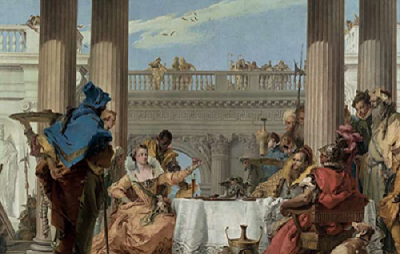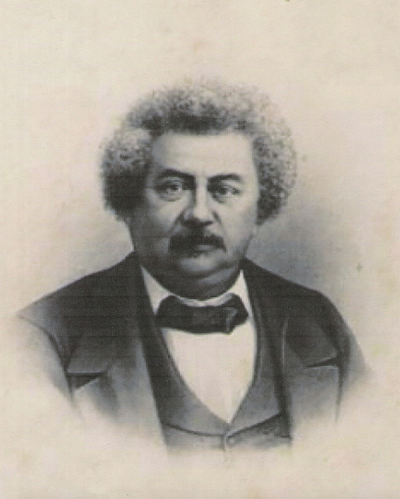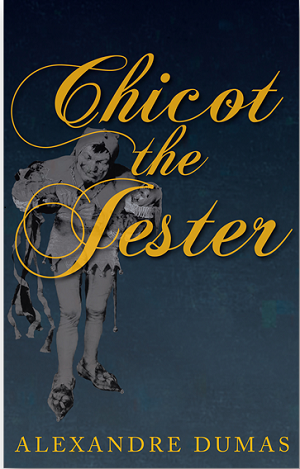Food, Wine, the Arts ... and Alexandre Dumas

When I first saw Tiepolo’s The Banquet of Cleopatra in my late teens I took no interest in the value of Cleopatra’s ill-fated pearl, but instead wondered about what manner of banquet had Antony concocted to try to impress a queen and rival her wealth. Every time I watch The Godfather I am certain I can smell the aroma of a tomato sauce with pork sausages and meatballs when cooked by “Fat” Clemenza (which, incidentally, is a sauce very similar to those in Martin Scorsese’s Goodfellas and Italianamerican). On reading Remembrance of Things Past I had wanted to taste not so much the famous ‘petites madeleines’, than rather a roast duck over which is ‘spilled numerous libations of red wine’, or a dish suggested by the scent of ‘a great chestnut tree, of baskets of raspberries, and of a sprig of tarragon.’ When I enter an Irish-styled pub I sometimes wonder if I will hear ‘the light music of whiskey falling into glasses,’ as wrote Joyce in his short story “Grace” (included in the collection Dubliners). I nowadays cannot buy a slice of capocollo, wafer-thin, without the slight trepidation that I might be overcome by anxiety and blackout (as did Tony Soprano in an early episode of The Sopranos). And at any suggestion of a sun-kissed picnic my mind automatically unspools these same images and in the same order—Le Déjeuneur des canotiers by Auguste Renoir (even though I know it was not painted plein air exactly, but either at the restaurant La Grenouillére or the restaurant Fournaise, both on the Seine); Les Déjeuner sur l’herbe, a late film by Auguste’s son, Jean (even though to date I’ve only seen clips from the film); and finally Manet’s painting of the same name (on which Jean Renoir’s film is based).
I have been long fascinated (perhaps obsessed) by representations of food and drink in painting, literature, sometimes television and, of course, in film. [1] Zola, Manzoni, Dickens, Colette, Dinesen (or should I say Blixen?), Amado, Pasolini, Scorsese, Coppola, Monicelli, Scola, Hitchcock, Chabrol, Buñuel (especially Buñuel), both Renoirs, da Vinci, Pontormo, Tiepolo, Cezanne, Manet, Bonnard—the names are as countless as the stars! What this goes to show is that many artists have a precise understanding about epicurean arts as they do about their chosen field. So much so that I sometimes imagine them exchanging recipes, or perhaps offering each other tidbits of gastronomic advice (as did Cezanne to Auguste Renoir with a recipe for baked tomatoes near the day of Jean Renoir’s birth [2] ). And I’ve come to embellish this fancy by imagining them with a bottle of one of my favourite wines (Gundog’s Marksman Shiraz, Moortangi’s Heathcote Old Vine Shiraz perhaps, or, most certainly, a Chateau Margaux) either tucked under an arm or placed prominently on the dinner table.
But, of all the artist names I could reel off, I believe there is one who eclipses them all—Alexandre Dumas. Although best known for The Count of Monte Cristo and The Three Musketeers, Dumas also authored the Grand Dictionnaire de Cuisine, and my favourite of his stories is the lesser-known La Dame de Monsoreau, titled Chicot the Jester in English.

This story is set against a backdrop of civil upheaval and tells of the friendship between King Henri III and his jester, which is interwoven with the story of the love that flowers between an impulsive but heroic nobleman, Comte de Bussy, and Diana, a 19 year old girl who had been tricked into marrying the chief huntsman Monsieur Bryan de Monsoreau.
Chicot enjoys extraordinary liberty at the court of Henri III, and is the king’s only trusted friend. At one point in this story Chicot suspects an intrigue when he happens to spot personal enemies (his, not the king’s) dressed as monks and entering the Abbey of St. Geneviéve, where, as it happens, his good friend the monk Gorenfolt is to deliver a sermon. Realising it is the hour when Gorenfolt would likely be at supper, Chicot goes in search of the monk to devise a way of gaining entry to the abbey and finds him at the establishment of one Monsieur Claude Boutromet. It is a Friday and the beginning of Lent, and so when Chicot enters the inn, Gorenfolt is pitifully turning over a plate of spinach, accompanied by a glass of water containing only a few drops of wine. The monk is also painfully aware that he should have already set off for the abbey.
To continue, here is an extract, which is deliciously humorous as much for Chicot’s subterfuge as for Dumas’ blasphemous intent. We take up the story just after Chicot has entered Boutromet’s inn and found his friend dining alone in a private room. [3]
(I recommend the reader do as I have done and imagine that the numerous bottles of Romanée wine ordered by Chicot are instead bottles of Gundog Shiraz, Moortangi, Chateau Margaux, or any wine that gives you a sense of mischief. Even better, I recommend the reader attempt Chicot’s recipe for roast capon, as it appears in this extract—served with your favourite bottle of red, the dish will mount to both heart and head!)

Chicot enters the private room:
"Ah, my friend! What are you doing?" cried Chicot, looking at the vegetables and at a glass filled with water just colored with a few drops of wine.
"You see, my brother, I sup," replied Gorenflot in a powerful voice.
"You call that supper, Gorenflot! Herbs and cheese?"
"We are in the beginning of Lent, brother; we must think of our souls," replied Gorenflot, raising his eyes to heaven.
Chicot looked astounded; he had so often seen Gorenflot feast in a different manner during Lent.
"Our souls!" said he; "and what the devil have herbs and water to do with them?"
"We are forbidden to eat meat on Wednesdays and Fridays."
"But when did you breakfast?"
"I have not breakfasted, my brother," said the monk.
"Not breakfasted! Then what have you done?"
"Composed a discourse," said Gorenflot proudly.
"A discourse, and what for?"
"To deliver this evening at the abbey."
"That is odd."
"And I must be quick and go there, or perhaps my audience will grow impatient."
Chicot thought of the infinite number of monks he had seen going to the abbey, and wondered why Gorenflot, whom certainly he had never thought eloquent, had been chosen to preach before M. de Mayenne and the numerous assemblage. "When are you to preach?" said he.
"At half-past nine."
"Good; it is still a quarter to nine, you can give me a few minutes. Ventre de biche! We have not dined together for a week."
"It is not our fault, but I know that your duties keep you near our King Henry III, while my duties fill up my time."
"Yes, but it seems to me that is so much the more reason why we should be merry when we do meet."
"Yes, I am merry," said Gorenflot, with a piteous look, "but still I must leave you."
"At least, finish your supper."
Gorenflot looked at the spinach, and sighed, then at the water, and turned away his head.
"Do you remember," said Chicot, "the little dinner at the Porte Montmartre, where, while the king was scourging himself and others, we devoured a teal from the marshes of the Grauge-Batelière, with a sauce made with crabs, and we drank that nice Burgundy wine; what do you call it?"
"It is a wine of my country, La Romanée."
"Yes, yes, it was the milk you sucked as a baby, worthy son of Noah."
"It was good," said Gorenflot, "but there is better."
"So says Claude Boutromet, who pretends that he has in his cellar fifty bottles to which that is paltry."
"It is true?"
"True, and yet you drink that abominable red water. Fie!" And Chicot, taking the glass, threw the contents out of window.
"There is a time for all, my brother," said Gorenflot, "and wine is good when one has only to praise God after it, but water is better when one has a discourse to pronounce,"
"Opinions differ, for I, who have also a discourse to pronounce, am going to ask for a bottle of Romanée. What do you advise me to take with it, Gorenflot?"
"Not these herbs, they are not nice." Chicot, seizing the plate, threw it after the water, and then cried, "Maître Claude."
The host appeared.
“Maître Claude, bring me two bottles of your Romanée, which you call so good.”
“Why two bottles,” said Gorenflot, “as I do not drink it?”
“Oh! If you did I would have four or six, but if I drink alone, two will do for me.”
“Indeed; two bottles are reasonable, and if you eat no meat with it, your confessor will have nothing to reproach you with.”
“Oh, of course not; meat on a Friday in Lent!”
And going to the larder, Chicot drew out a fine capon.
“What are you doing, brother?” said Gorenflot, following his movements with interest.
“You see I am taking this carp.”
“Carp!” cried Gorenflot.
“Yes, a carp,” said Chicot, showing him the tempting bird.
“And since when has a carp had a beak?”
“A beak! Do you see a beak? I only see a nose.”
“And wings?”
“Fins!”
“Feathers?”
“Scales, my dear Gorenflot, you are drunk.”
“Drunk! I, who have only eaten spinach and drunk water?”
“Well, your spinach has overloaded your stomach, and your water has mounted to your head.”
“Parbleu! Here is our host, he shall decide.”
“So be it, but first let him uncork the wine.”
M. Boutromet uncorked a bottle and gave a glass to Chicot. Chicot swallowed and smacked his lips.
“Ah!” said he, “I have a bad memory, I cannot remember if it be better or worse than that at Montmartre. Here, my brother, enlighten me.”
Chicot gave a little to the monk, who was looking on with eager eyes. Gorenflot took the glass, and drank slowly the liquor it contained.
“It is the same wine,” said he, “but I had too little to tell whether it be better or worse.”
“But I want to know, and if you had not a sermon to preach, I would beg you to drink a little more.”
“If it will give you pleasure, my brother.”
Chicot half filled the monk's glass. Gorenflot drank it with great gravity.
“I pronounce it better,” said he.
“You flatter our host. A good drinker ought, at the first draught, to recognize the wine, at the second, the quality, and, at the third, the age,” said Chicot, “Oh! I should like to know the age of this wine.”
“Give me a few drops more, and I will tell you,” said Gorenfolt.
Chicot filled Gorenfolt glass. He drank it off, and then said, “1561.”
“Right,” cried Claude Boutromet, “it was 1561.”
“Brother Gorenflot,” cried Chicot, “they have beatified men at Rome who were worth less than you.”
“A little habit,” said Gorenflot, modestly.
“And talent; for I flatter myself I have the habit, and I could not do it. But what are you about?”
“Going to my assembly.”
“Without eating a piece of my carp?”
“Ah, true; you know still less of eating than drinking. M. Boutromet, what is the name of this animal?”
The innkeeper looked astonished. “A capon,” said he.
“A capon!” cried Chicot, with an air of consternation.
“Yes, and a fine one,” replied M. Boutromet.
“Well!” said Gorenflot, triumphantly.
“Well, it seems I was wrong, “admitted Chicot, “but as I wish to eat this capon and yet not sin, be so kind, brother, as to throw a few drops of water upon it, and christen it a carp.”
“Ah! Ah!”
“Yes, I pray you, save me from mortal sin.”
“So be it,” cried Gorenflot, “but there is no water.”
“Oh! The intention is all; baptize it with wine, my brother; the animal will be less Catholic but quite as good.”
And Chicot refilled the monk's glass. The first bottle was finished.
“In the name of Bacchus, Momus, and Comus, trinity of the great saint Pantagruel, I baptize thee, carp,” said Gorenflot.
“Now,” said Chicot, “to the health of the newly baptized; may it be cooked to perfection, and may M. Boutromet add to the excellent qualities which it has received from nature.”
“To his health,” cried Gorenflot, interrupting a hearty laugh to swallow his wine.
“M. Claude, put this carp at once on the spit, cover it with fresh butter, with shallots in it, and put some toast in the frying-pan, and serve it hot.”
Gorenflot approved with a motion of his head.
“Now, M. Boutromet, some sardines and a tunny fish, meanwhile; it is Lent, and I wish to make a maigre dinner. And let me have two more bottles of wine.”
The smell of the cookery began to mount to the brain of the monk. Yet he made a last effort to rise ...
I’m sure you will have guessed the outcome—Gorenfolt does not make it to the abbey to deliver his sermon! Chicot, having borrowed the monk’s robe, goes instead, while Gorefolt is left snoring contentedly on the floor of the inn, drunk, and naked save for a tablecloth Chicot has wrapped around the monk’s portly physique. [4]
Notes
[1] As an example, see Raffaele Caputo’s only entry in The Oxford Companion to Australian Film (1999), simply titled ‘Food’.
[2] See Renoir, My Father (1962) by Jean Renoir.
[3] This extract is from Chapter 18 of Dumas’ book.
[4] A much shorter version of this article was first published in the Gundog Estate Newsletter in 2006.
-
Posted In:
- General
- 17 comments



Comments
- - 30 Nov 1999 11:00:00 AM
Our academic pursuits, along with a range of extracurricular activities, help in honing a child's skills and ensuring that he/she grows to be a mature and responsible citizen.Mkt Bhavish
best School in noida
- - 30 Nov 1999 11:00:00 AM
Great post. Articles that have meaningful and insightful comments are more enjoyable, at least to me. It’s interesting to read what other people thought and how it relates to celebrity jackets them as their perspective could possibly help you in the future.david joe
- - 30 Nov 1999 11:00:00 AM
Very nice content. Great job. https://instahotstar.com/buy-instagram-followers-cheap-usd-1Sunil Kumar
- - 30 Nov 1999 11:00:00 AM
I found this blog. Much appreciation to you for offering to us, I, everything considered, find some new data from your post. to a cerebrum boggling degree satisfying Blade Runner Jacket and I to an amazing degree like your article a commitment of Thankfulness is everythingshawn kemp
- - 30 Nov 1999 11:00:00 AM
Very nice contentSunil Kumar